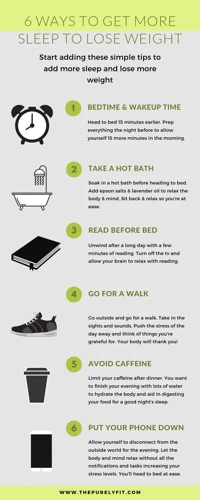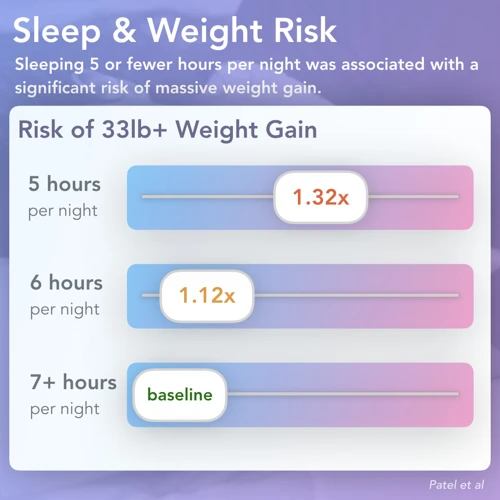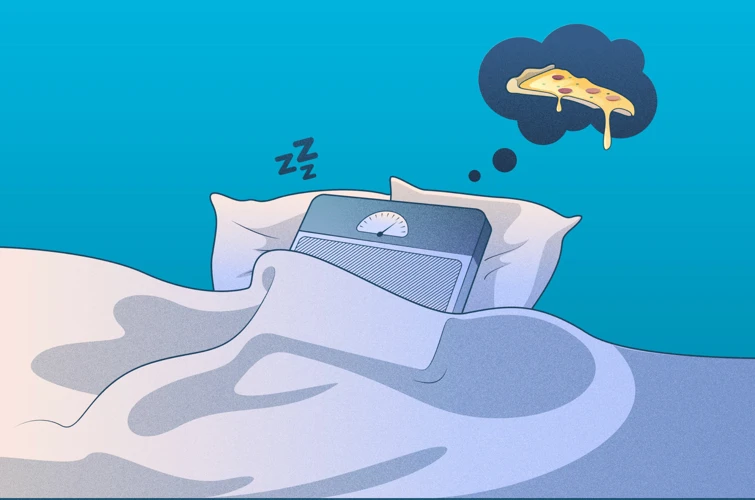For many of us, losing weight can be a challenging and frustrating process. We embark on diets and exercise routines, hoping that they will finally help us shed those unwanted pounds. However, what we often overlook is the crucial role that a good night’s sleep can play in our weight loss journey. Yes, you read that right – getting enough sleep can actually aid weight loss. In fact, studies have found a strong link between sleep quality and weight – or lack thereof. So, how exactly does proper sleep contribute to weight loss? In this article, we’ll explore the science behind it and provide practical tips for improving your sleep hygiene to aid your weight loss efforts.
The Importance of Sleep for Weight Loss

Sleep is an essential aspect of our daily lives, and it has a vital impact on our overall health and well-being. Getting enough rest is crucial for maintaining a healthy weight, but it’s often overlooked when discussing weight loss. Many individuals focus on dietary changes and exercise routines without considering their sleeping habits. However, research has shown that proper sleep can help aid in weight loss, improve overall health, and reduce the risk of obesity-related health complications. In this section, we’ll explore the connection between sleep and weight loss and how getting enough rest can make a significant difference in reaching your weight loss goals. So, let’s dive in and explore how proper sleep can help you lose weight.
1. How Sleep Affects Your Hormones
Proper sleep is essential for maintaining optimal health and well-being. One of the ways sleep can affect weight loss is through its impact on our hormones. Hormones are chemical messengers that regulate various bodily functions, including hunger and metabolism. When we don’t get enough sleep, it can disrupt the delicate balance of our hormones, which can lead to weight gain.
Here’s a look at some of the hormones that are affected by sleep:
| Hormone | Effect of Sleep |
|---|---|
| Leptin | Leptin is a hormone that signals to the brain when we are full and should stop eating. When we don’t get enough sleep, our leptin levels decrease, which can lead to overeating. |
| Ghrelin | Ghrelin is a hormone that signals to the brain when we are hungry and need to eat. When we don’t get enough sleep, our ghrelin levels increase, which can make us feel hungrier and lead to overeating. |
| Cortisol | Cortisol is a stress hormone that can also affect metabolism. When we don’t get enough sleep, our cortisol levels increase, which can lead to weight gain. |
Getting enough sleep is crucial for maintaining a healthy weight, as it can help keep these hormones in balance. In addition to following good sleep hygiene practices, it’s also important to focus on stress reduction techniques to manage cortisol levels. Integrating healthy sleep habits into your weight loss plan can help you achieve and maintain your goals.
2. The Connection Between Sleep and Appetite
One of the ways that proper sleep can help with weight loss is by regulating appetite. When we don’t get enough sleep, we disrupt the levels of two hormones that play a major role in regulating hunger: ghrelin and leptin.
Ghrelin is a hormone that stimulates appetite, while leptin sends signals to the brain to stop eating. When we don’t get enough sleep, levels of ghrelin rise and levels of leptin are suppressed, which can lead to overeating and weight gain.
Lack of sleep can also lead to increased cravings for indulgent, high-calorie foods. In a sleep-deprived state, our brain tends to crave foods that are rich in sugar and fat, which can further promote weight gain.
On the other hand, getting enough good quality sleep helps your body maintain a healthy hormonal balance, which keeps your appetite under control and reduces the likelihood of overeating. This is why it’s important to prioritize sleep as a part of your weight loss journey.
3. Sleep and Calorie Burning
When it comes to weight loss, burning calories is a crucial component. Proper sleep can actually help with this. During sleep, the body’s metabolic rate decreases, but the body still burns calories for basic functions such as breathing and circulation. Getting enough sleep also allows for better physical performance during waking hours, which can aid in burning more calories.
Factors affecting calorie burning during sleep
| Factor | Effect on Calorie Burning |
| — | — |
| Body Mass | The larger the body mass, the more calories burned during sleep |
| Muscle Mass | Higher muscle mass leads to greater calorie burning during sleep |
| Age | Calorie burning decreases with age |
| Sleep Quality | Poor sleep quality can decrease the body’s ability to burn calories during sleep |
The impact of sleep on exercise performance
Exercise is essential for weight loss, but proper sleep is also important for maximizing the benefits of exercise. Lack of sleep can lead to decreased exercise performance which, in turn, can lead to burning fewer calories during workouts. In contrast, good sleep can lead to better exercise performance and ultimately more calories burned during physical activity.
So, if you want to maximize your calorie burn and aid in weight loss, don’t neglect the importance of quality sleep. Factors such as body mass, muscle mass, age, and sleep quality all have an impact on the body’s ability to burn calories during sleep. Incorporating good sleep habits into your routine can also lead to better exercise performance and more calories burned during physical activity.
Tips for Getting Better Sleep

Getting a good night’s sleep is essential for overall health and well-being, especially when it comes to weight loss. Unfortunately, many people struggle with getting the recommended amount of sleep each night. If you’re one of those people, don’t worry! There are several tips you can follow to improve your sleep hygiene and increase your chances of a better and deeper sleep. From establishing a sleep routine to creating a soothing environment and avoiding stimulants before bedtime, read on to discover some highly-effective strategies to help you achieve better sleep quality.
1. Establish a Sleep Routine
Establishing a consistent sleep routine is an essential step towards improving the quality and quantity of your sleep. Here are some tips for establishing a healthy sleep routine:
| Tip | Description |
|---|---|
| 1. Stick to a Regular Bedtime | Go to bed at the same time every night, even on weekends. This helps regulate your body’s internal clock and can improve the overall quality of your sleep. |
| 2. Create a Relaxing Pre-Sleep Routine | Develop a relaxing pre-sleep routine to help signal to your body that it’s time to sleep. This can include activities such as taking a warm bath or shower, reading a book, or listening to calming music. |
| 3. Avoid Electronics | Avoid using electronic devices such as smartphones, tablets, or laptops in the hours leading up to bedtime. The blue light emitted by these devices can interfere with your body’s natural sleep-wake cycle. |
| 4. Create a Comfortable Sleep Environment | Create a comfortable sleep environment by keeping your bedroom dark, cool, and quiet. Consider investing in comfortable bedding and pillows to help you sleep better. |
| 5. Avoid Stimulants | Avoid consuming caffeine or alcohol in the hours leading up to bedtime, as they can interfere with your ability to fall asleep and stay asleep. |
By implementing these simple tips into your daily routine, you can establish healthy sleep habits that can improve the quality and quantity of your sleep, leading to better overall health and a more successful weight loss journey.
2. Create a Soothing Sleep Environment
Creating a soothing sleep environment is crucial for getting quality sleep, which in turn can aid in weight loss. Here are some tips to create a peaceful sleep environment:
- Keep the room cool: Set the temperature between 60-67°F (15.6-19.4°C) for optimal sleep.
- Invest in comfortable bedding: Choose comfortable pillows and a mattress that supports your body well. Also, consider using breathable and moisture-wicking sheets to keep you cool and comfortable.
- Eliminate noise: If there are external noises that you can’t control (like traffic or noisy neighbors), consider using earplugs or a white noise machine to drown out the noise and create a peaceful environment.
- Make the room dark: Use blackout curtains or an eye mask to block out any light that may interfere with your sleep.
- Keep the room clutter-free: A cluttered room can create stress and anxiety, making it difficult to fall asleep. Keep your room organized and tidy.
- Create a calming atmosphere: Use calming colors, scented candles or essential oils, and soft lighting to create a calming atmosphere that promotes relaxation and restful sleep.
By creating a soothing sleep environment, you can improve the quality of your sleep, helping you to wake up refreshed and energized for your weight loss journey.
3. Avoid Stimulants Before Bedtime
It’s important to avoid consuming stimulants before bedtime as they can make it difficult for you to fall asleep. Stimulants, such as caffeine and nicotine, can keep you awake and disrupt your natural sleep cycle. Consuming stimulating drugs before bedtime can increase the amount of time it takes for you to fall asleep, decrease the amount of time you spend in deep sleep, and reduce the overall quality of your sleep. It’s important to avoid consuming these substances before bedtime to ensure a good night’s sleep and maintain your weight loss plan.
To avoid consuming stimulants before bedtime, consider the following tips:
| Avoid caffeine in the afternoon and evening | While a cup of coffee in the morning can provide a boost of energy, caffeine can stay in your system for hours and interfere with your ability to fall and stay asleep at night. It’s best to avoid consuming caffeine after lunchtime, especially in the evening. |
| Avoid nicotine | Like caffeine, nicotine is a stimulant that can keep you awake and disrupt your natural sleep cycle. Avoiding smoking or using other tobacco products before bedtime can help you maintain a healthy sleep schedule and lose weight. |
| Avoid alcohol before bedtime | While alcohol may make you drowsy at first, it can actually disrupt your ability to stay asleep throughout the night. It’s best to avoid consuming alcohol before bedtime and limit your overall alcohol intake to maintain a healthy sleep schedule. |
| Avoid eating heavy meals before bedtime | Eating a heavy meal before bedtime can cause indigestion and make it difficult for you to fall asleep. It’s best to eat a light meal at least two to three hours before bedtime to allow your body enough time to digest the food. |
By avoiding stimulants before bedtime and following these tips, you can improve the quality of your sleep and maintain your weight loss plan. Getting a good night’s sleep is essential for weight loss as it can regulate your hormones, reduce your appetite, and improve calorie burning. It’s important to make sleep a priority in your weight loss journey.
The Relationship between Lack of Sleep and Weight Gain

The connection between sleep and weight loss is well established, but what about the link between lack of sleep and weight gain? It’s a topic that has been the focus of numerous studies, and the findings are clear: insufficient sleep can have a significant impact on your weight. In fact, research has shown that lack of sleep can not only hinder weight loss efforts, but it can also lead to weight gain. So, what are the mechanisms behind this relationship, and what can you do to ensure that you’re getting enough sleep to support your weight loss goals? Let’s take a closer look.
1. Affects on Appetite
One of the most significant impacts of lack of sleep on our weight is the effect it has on our appetite. The relationship between sleep and hunger is complex, and researchers have discovered several ways in which a lack of sleep can lead to overeating.
Sleep Deprivation Increases Levels of Ghrelin: Ghrelin is a hormone that is responsible for stimulating appetite. When we don’t get enough sleep, our bodies produce more ghrelin, which can lead to an increase in hunger and cravings.
Reduces Levels of Leptin: Leptin is a hormone that helps to regulate our appetite and tells us when we are full. When we don’t get enough sleep, our bodies produce less leptin, which can result in us feeling less satisfied after meals and therefore wanting to eat more.
Increases Cravings for High-Calorie Foods: Studies have found that individuals who are sleep-deprived have a stronger preference for high-calorie, high-carbohydrate foods than those who are well-rested. This is believed to be due to changes in the way the brain processes rewards and the desire for instant gratification.
To summarize, a lack of sleep has a significant impact on our appetite, causing us to feel hungrier, less satisfied after meals, and increasing cravings for high-calorie foods. Incorporating good sleep hygiene into our weight loss plan is crucial to combat these effects and help us achieve our weight loss goals.
Below is a table summarizing the effects of lack of sleep on our appetite:
| Lack of Sleep: | Effect on Appetite: |
|---|---|
| Increases levels of Ghrelin: | Leads to an increase in hunger and cravings. |
| Reduces levels of Leptin: | Causes individuals to feel less satisfied after meals and want to eat more. |
| Increases cravings for high-calorie foods: | Individuals have a strong preference for high-calorie, high-carbohydrate foods. |
2. Affects on Overall Health
Lack of proper sleep not only affects your weight, but it can also have a significant impact on your overall health. In fact, chronic sleep deprivation has been linked to a variety of health problems, including:
- Increased Risk of Heart Disease – Lack of sleep can lead to an increase in blood pressure and inflammation, both of which are risk factors for heart disease. Additionally, those who consistently get less than six hours of sleep a night are at a higher risk of developing heart disease.
- Impaired Immune Function – Sleep plays a vital role in the functioning of our immune system. Lack of sleep can weaken our immune system and make us more susceptible to infections, illnesses, and diseases.
- Higher Risk of Type 2 Diabetes – Getting less than six hours of sleep a night can lead to insulin resistance and a higher risk of developing type 2 diabetes.
- Increased Risk of Depression – Chronic sleep deprivation has been linked to an increased risk of developing depression. Additionally, those who already suffer from depression are more likely to experience sleep issues.
- Impaired Cognitive Functioning – Lack of sleep can lead to impaired cognitive function, including problems with memory, concentration, and decision-making.
As you can see, the effects of sleep deprivation go far beyond just feeling tired the next day. Incorporating good sleep hygiene into your weight loss plan can not only help you shed pounds but can also improve your overall health and well-being.
3. Affects on Exercise Performance
Getting a good night’s sleep not only affects your appetite and hormones, but it can also have a significant impact on your exercise performance.
Studies have shown that lack of sleep can decrease your ability to perform at peak levels during exercise. When you are sleep-deprived, you may experience a decreased energy level, making it harder to motivate yourself to exercise at all.
Lack of sleep can lead to reduced endurance, strength, and reaction time. Your body may also have a harder time recovering after exercise, as the muscle cells responsible for repair and rebuilding are less efficient without proper rest.
Here are some examples of how lack of sleep can affect exercise performance:
| Lack of Sleep | Effects on Exercise Performance |
|---|---|
| Only 4-5 hours per night | 20-30% decrease in endurance and aerobic capacity |
| Less than 6 hours per night | Reduced reaction time and agility |
| Less than 7 hours per night | Decrease in overall exercise performance |
As you can see, even small reductions in sleep time can have a significant impact on your exercise performance. Incorporating good sleep habits into your weight loss plan can help ensure that you have the energy and motivation to exercise to the best of your ability.
Incorporating Good Sleep Hygiene into Your Weight Loss Plan
Once you understand the importance of proper sleep for weight loss, it’s time to incorporate good sleep hygiene into your weight loss plan. This means developing habits and practices that promote restful, high-quality sleep.
Establish a consistent sleep schedule: Go to bed and wake up at the same times every day, even on weekends. This helps regulate your body’s natural sleep-wake cycle and can result in better sleep quality.
Create a relaxing sleep environment: Make sure your bedroom is cool, quiet, and dark. Consider using blackout curtains, earplugs, or a white noise machine if you need to block out external stimuli.
Avoid screen time before bed: The blue light emitted by laptops, smartphones, and other screens can disrupt your sleep patterns. Try to avoid using electronics for at least an hour before bed.
Avoid stimulants before bedtime: Caffeine and alcohol can interfere with your sleep. Avoid consuming them for at least a few hours before you plan to go to bed.
Develop a bedtime routine: Having a consistent pre-sleep routine can signal to your brain that it’s time to wind down. This might involve reading, taking a warm bath, or practicing relaxation techniques like yoga or deep breathing.
Incorporating these habits into your daily routine can help you fall asleep faster, stay asleep longer, and wake up feeling more rested. By getting quality sleep on a regular basis, you’ll be better equipped to stick to your weight loss plan and achieve your goals.
Conclusion
In conclusion, it is evident that proper sleep plays a crucial role in weight loss. Not only does it affect hormone levels and appetite, but it also impacts the body’s ability to burn calories efficiently. By establishing a consistent sleep routine, creating a calm sleep environment, and avoiding stimulants before bedtime, individuals can significantly improve the quality of their sleep.
It is also important to note that lack of sleep can have detrimental effects on weight loss efforts. It can lead to an increase in appetite, poor overall health, and decreased exercise performance. Therefore, incorporating good sleep hygiene into a weight loss plan is essential for achieving long-term success.
In addition to promoting weight loss, getting proper sleep has numerous other benefits for overall health and well-being. It can improve memory and cognitive function, boost immunity, and reduce the risk of developing chronic diseases.
Overall, by prioritizing good sleep habits and understanding the connection between sleep and weight loss, individuals can take a significant step towards achieving their weight loss goals and improving their overall health.
Frequently Asked Questions
Can lack of sleep cause weight gain?
Yes, lack of sleep has been shown to disrupt hormones that regulate appetite, leading to increased hunger and cravings, and can also decrease metabolism.
How many hours of sleep are recommended for weight loss?
Most adults require 7-9 hours of sleep per night for optimal health, including weight management.
Can taking melatonin supplements improve sleep and aid weight loss?
While melatonin can aid in sleep, there is no evidence to suggest that it directly leads to weight loss.
Does exercising in the evening affect sleep quality?
For some people, exercising before bed can lead to difficulty falling asleep, while for others it does not have an impact. It is important to listen to your body and adjust your workout schedule accordingly.
Can drinking water before bed improve sleep quality?
Drinking water before bed can prevent dehydration and promote better sleep, but it is important to not drink too much to avoid disrupting sleep with frequent trips to the bathroom.
Does exposure to bright screens before bed affect sleep quality?
Yes, exposure to bright screens, including those on electronic devices, can disrupt the natural production of sleep hormones and lead to more difficulty falling asleep.
Does alcohol affect sleep quality and lead to weight gain?
While alcohol can initially make it easier to fall asleep, it can lead to disrupted sleep and decreased metabolism, potentially contributing to weight gain.
Can incorporating mindfulness practices into a bedtime routine improve sleep quality?
Yes, incorporating mindfulness practices, such as deep breathing exercises or meditation, can promote relaxation and better sleep quality.
How long does it take to establish a consistent sleep routine?
It can take up to several weeks of consistent effort to establish a consistent sleep routine and see improvement in sleep quality.
Can chronic lack of sleep lead to other health problems besides weight gain?
Yes, chronic lack of sleep has been linked to a variety of health problems, including increased risk for heart disease, diabetes, and mental health disorders.







